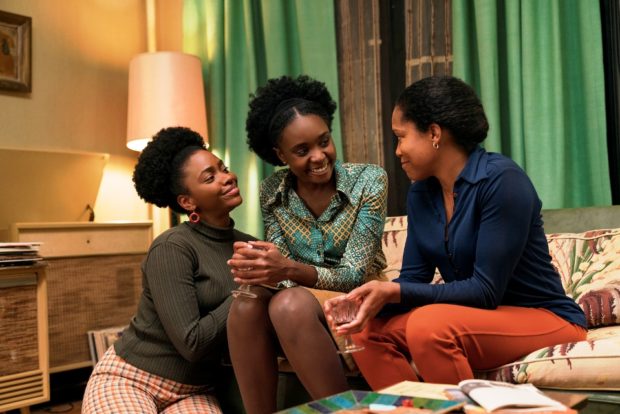

Barry Jenkins adapts a James Baldwin novel about a black couple who won’t let anything, including an unjust arrest, keep them apart.
When we last saw writer-director Barry Jenkins, his film Moonlight, which was only his second feature, had won Best Picture and two other Oscars at the Academy Awards a couple of years ago. How does a filmmaker follow up from that? In Jenkins’ case, the answer is simple: you just stay true to your vision, in this case adapting a 1974 James Baldwin novel, If Beale Street Could Talk.
We follow a young black couple in Harlem, Clementine and Alonzo, who go by the nicknames Tish and Fonny. It is evident from the movie’s first frame that this is no casual relationship. They are deeply in love, and will endure anything for the sake of their love, and resist anything that threatens that love. We enter in the middle of the story—Fonny is in jail awaiting trial, Tish and her family are working hard to free him. She has also just discovered that she’s pregnant—he responds with joy when she tells him this on one of her jail visits. Her parents and sister are a little taken aback because Fonny and Tish aren’t married, but they support her. Fonny’s mother, however, a strict and self-righteous Christian, is outraged, and his two sisters follow her lead. Only his father responds positively and with love.
From this situation, the film uses flashbacks that follow the lovers into the past. We learn that these two have known and adored each other since childhood. We find out why and how Fonny got arrested, and that he is innocent of the charge. There’s a continuous movement back and forth, from present to past to present, and the passionate story goes ever deeper. Along with traditional dramatic tensions, helps and hurt within the families, and practical-minded scenes such as trying to find an affordable apartment, we are also confronted, inevitably, with the struggles imposed by white supremacy and racism. These racial elements are, for the most part, not even personal. It is a black community in which the characters grow and adhere. The problems we see are mostly institutional—unemployment, lack of educational opportunity, attitudes from the police, and so forth. If you’re familiar with James Baldwin’s thought, you know that racism is not a matter of mere prejudice, of people looking down on other people, but of structures that are embedded, baked, so to speak, into society.
At the center of this movie is Kiki Layne, who plays Tish. Rarely has a relative newcomer been this vulnerable on screen. She’s lovely and innocent, but her strength and intelligence are formidable as well. Fonny is played by Stephan James, and he’s a perfect match for her. Both of them have faults, of course, occasional bad tempers and whatnot, but Jenkins is essentially a romanticist like Baldwin, and here the accent is on the patient details of their emotions, their faces, each with a loving gaze upon one another. As we saw in Moonlight, he takes his time with his style—the idea is to immerse you ever so gradually into this world. Along with the two leads, a wonderful standout is Regina King as Tish’s mother, radiating courage and steadfast protective love for her daughter, as she does all she can to get Fonny out of jail. The picture is rich with close-ups—the human face is Jenkins’ window into truth. The camera is also in love with the city—even though it can be a place of deprivation and misery, love illumines New York with its light.
The title, If Beale Street Could Talk, was meant by Baldwin to evoke all the streets in all the cities in which African Americans are born, live, work, love and die. Beale is a street in Memphis on which a lot of great music was born, but oddly, Baldwin got it confused with New Orleans. The actual city of the story is of course New York. But in any case, the name of the street is like a free-floating metaphor for the black experience in America.
If Beale Street Could Talk it would also cry in pain and exaltation. This is an intensely beautiful film, sensitive and wise.

